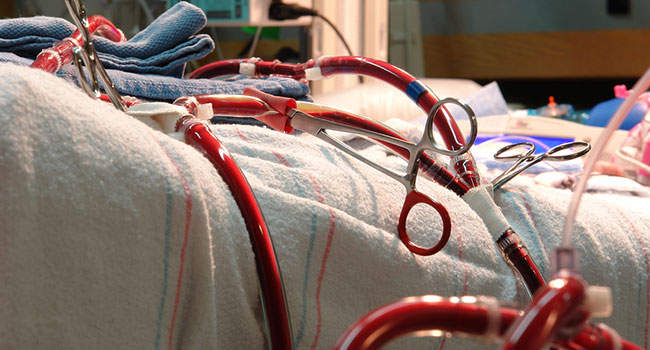Extracorporeal Life Support may aid Severe COVID-19 Patients
Jun 11, 2020 by Iris Dawn TabangcoraA West Virginia University study has found that the extracorporeal membrane oxygenation (ECMO) machine can extend life support for patients with severe COVID-19 when ventilators alone become inadequate for survival.

ECMO works by oxygenating a patient's blood outside of their body and then returning it, giving the lungs and heart time to rest and heal. This is particularly helpful with COVID-19 patients whose lungs are at risk and can deteriorate quickly. When the lungs begin to fail, the oxygen supply to vital organs like the brain, heart, and kidneys is compromised.
The study involved 32 patients with severely compromised lung function. Of these, 22 had survived on ECMO. Only five were successfully removed from ECMO and lived while the remaining 17 patients were still on ECMO.
The common denominator among these five patients is that they all received a type of ECMO that only supports the lungs. At the time of analysis, no patients with ECMO supporting both lungs and heart were removed from the machine successfully. The researchers think that the disparity exists because those with both lung and heart ECMO support were in worse condition to begin with. Furthermore, they observed that patients with dysfunction limited to only the lungs had a better prognosis. They also found that patients below the age 65 with fewer medical issues (e.g. hypertension, obesity, diabetes) fared better on ECMO than their counterparts.
The findings of this study provide useful insight for clinicians in counseling patients and family members regarding individualized treatment plans, especially if the situation calls for determining if the benefits of ECMO outweigh the risks.
The study concluded that in instances where patients deteriorate so quickly that their lungs become dysfunctional, ECMO may be a viable option.
Learn more at
Next »
Signup to this free service to be notified of:
- Clinical trials that match your condition
- Clinical trials that pay healthy volunteers
Signup and be matched to trials near you
